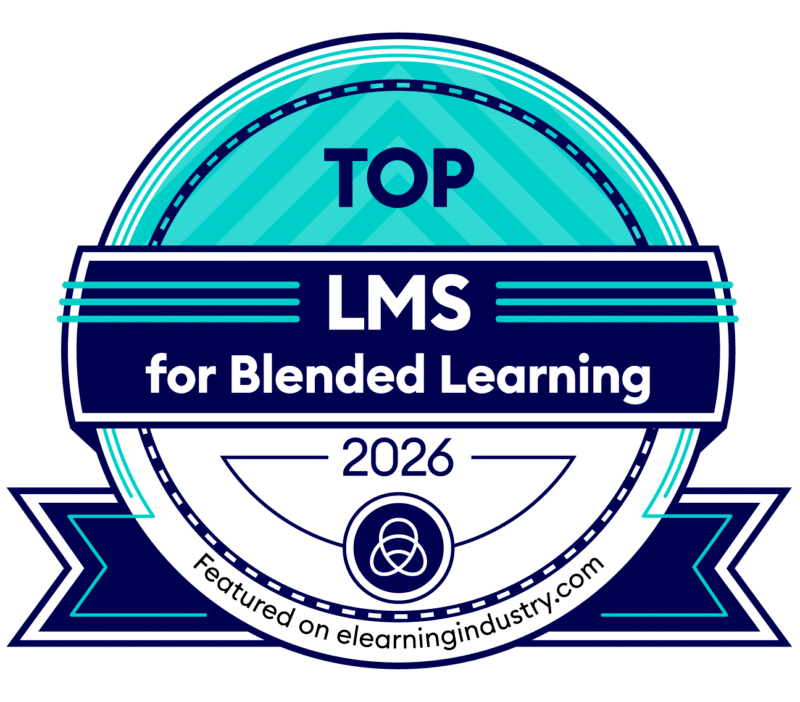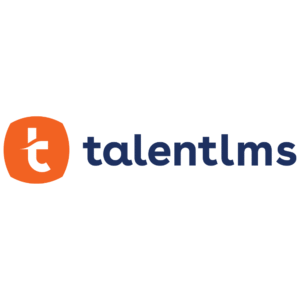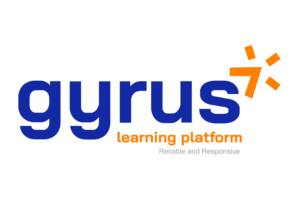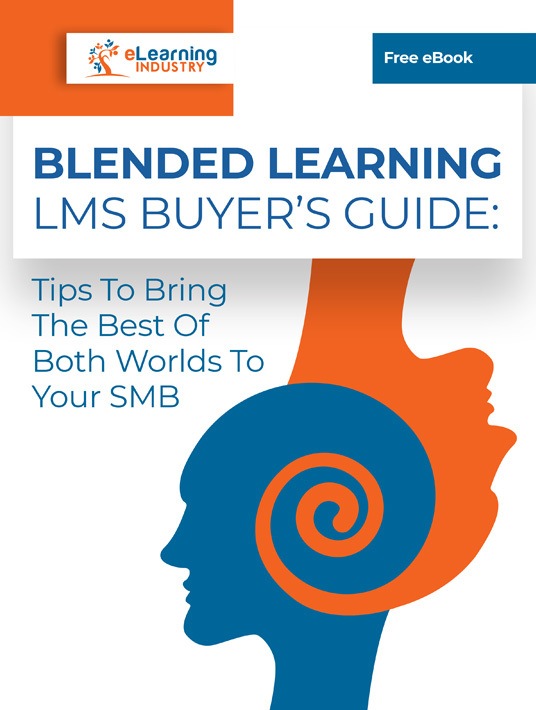Top Blended Learning Management Solutions
Do you find it hard to pick the best blending learning LMS solution for your business needs? Worry not because, after this list, you'll know how to make the ideal LMS decision. As a method, blended learning combines a traditional instructor-led approach and online learning. Meaning, you can have it both ways, thus enabling learners to have more control over their training.
By implementing an LMS for blended learning, training managers can streamline and simplify tasks. At the same time, they can still deliver a targeted and flexible training program. Most importantly, they can customize the training program to the needs of different learners because of this flexibility.
It's well known that a blended learning strategy is often the favored method of companies wishing to train their employees effectively. While blending learning can work well for most industries, it has proven particularly valuable for industries like manufacturing and healthcare. What's more, it is also an efficient method for sales training.
Explore eLearning Industry's list of top blended learning tools to:
- Find LMS platforms that meet your budget
- Explore top LMS features for blended learning
- Evaluate blended learning platforms and check user reviews
- Compare LMS solutions for a mixed learning approach
- Find the most suitable LMS via a demo or a free trial and test its UI
Our eLearning experts have selected the best Learning Management Systems for blended learning in this hand-picked list. However, if you're interested in a specific LMS use case, please visit our complete LMS directory.
The Best LMS Solutions For Blended Learning In 2026
 If your tool is among the Best Blended Learning LMS Solutions in 2026, feel free to add this badge to your website!
If your tool is among the Best Blended Learning LMS Solutions in 2026, feel free to add this badge to your website!
Offer Your Learners The Best Of Both Online And Offline Training
Blend in-person and online training to enjoy a boost in learner adoption and engagement. Cater to different learning styles with a flexible LMS 70,000+ teams trust for training.
Launch sync and async training on an easy-to-use platform.
Start free, no credit card needed!
Take a look at real user reviews for TalentLMS.
Highlights
- Connect Virtually
- Work And Train Uninterrupted
- Hassle-Free Admin
Read more
Highlights
Make long distance work. Transform traditional Instructor-Led Training into engaging online sessions with built-in (or integrated) videoconferencing tools.
- Work And Train Uninterrupted
Free your teams from disruptive and exhausting training days with self-led courses they can dive into at their own pace and convenience—without interrupting their work day.
Sail through your day with all the tools to organize vital in-person sessions, oversee learners and instructors, and track progress with a robust reporting engine.
Plans And Pricing
TalentLMS pricing is upfront and transparent. Which means all the prices are right there on the website. Start free, discover the platform, and upgrade when you're ready to a flexible plan with the advanced features and user number you need.
Top-Notch Platform To Build, Manage, And Scale Blended Learning Programs
360 Learning enables performance-driven L&D teams to create powerful blended learning paths. Their platform seamlessly combines virtual webinars, in-person training, and peer-to-peer knowledge sharing to drive skills development at scale. Ready to go beyond top-down training?
See how to unlock your internal expertise for powerful blended learning.
Read reviews for 360Learning in our directory.
Highlights
- Empower Every Learner, Everywhere
- Personalized Paths For Rapid Skill Development
- Classroom Management
Read more
Highlights
- Empower Every Learner, Everywhere
Effortlessly combine Zoom-powered virtual webinars, and a Google Calendar RSVP data sync with flexible in-person training, ensuring the right format reaches every learner, anytime and anywhere.
- Personalized Paths For Rapid Skill Development
Curate tailored learning paths for every learner, ensuring fast skill development across diverse needs and goals.
Optimize blended learning impact by implementing data-driven classroom management, resulting in increased fill rates, attendance monitoring, and comprehensive training insights.
Plans And Pricing
With a flexible pricing model, 360Learning caters to organizations of all sizes, ensuring a comprehensive and efficient blended learning experience. The platform drives effective upskilling, combining digital and live training seamlessly.
Personalized Learning Experiences For Both Internal And External Learners
Adobe Learning Manager is an award-winning learning platform designed to offer AI-driven personalized learning experiences for employees, customers, and partners alike. It's known for its state-of-the-art security, agility, and performance. Do you need one platform for all your blended learning needs for both internal and external audiences?
Learn how Learning Manager addresses your use cases.
Explore user reviews for Adobe Learning Manager.
Highlights
- Instructor/Attendee Management
- Native Integration With Web Conferencing Tools
- Easy Setup Of Blended Learning Programs
Read more
Highlights
- Instructor/Attendee Management
Learning Manager comes with an in-built instructor, classroom, and attendee management system that allows administrators to set up classrooms, waitlists, and attendees.
- Native Integration With Web Conferencing Tools
Learning Manager has native integrations with leading web conferencing tools. Learners can also access the learning platform from within MS Teams.
- Easy Setup Of Blended Learning Programs
With its easy administrative features and LXP UI, Learning Manager offers an easy way to set up blended learning programs.
Plans And Pricing
Learning Manager offers a monthly active user or registered user-based pricing model. The blended learning features are offered for both internal and extended enterprise systems, and it is easy to set up blended learning programs for any audience.
An Intuitive LMS To Quickly Launch Blended Learning And Maximize Its ROI
iSpring is a global eLearning expert and software provider. Since 2001, the company has been spreading its expertise around the world and developing robust tools for online and blended training to help businesses thrive.
Launch effective blended training, streamline processes, and achieve unmatched learner engagement with iSpring Learn LMS.
Make sure to visit our directory and read user reviews for iSpring Learn.
Highlights
- Blended Training Programs
- Smart Training Management
- Advanced Reporting
Read more
Highlights
- Blended Training Programs
Create sequential, multimodal learning tracks that combine courses, video lectures, mentoring sessions, webinars, and final tests, and assign them to groups or individuals.
- Smart Training Management
Plan all your activities on a single calendar, host and attend Zoom or MS Teams sessions directly from the LMS, and automatically notify learners when the schedule changes.
Track training from every angle with 20+ detailed, scheduled reports and visual dashboards to get any statistics you need, including learner attendance in live sessions.
Plans And Pricing
The cost depends on the number of active users and starts at $3.75 per user/month. You can also test-drive the platform with a free 30-day trial or schedule a live demo at no cost.
Rockstar Learning Platform Easily Delivers And Tracks Blended Learning
ELB Learning offers a suite of products and services to help you deliver immersive, engaging, blended learning. They create and deliver turnkey and custom learning solutions, including eLearning, games, VR, video practice, and more.
Request a demo or sign up for a free starter account on their website.
Visit our directory and check out Rockstar Learning Platform reviews.
Highlights
- Event Manager
- Integrations
- Learner Activities
Read more
Highlights
Create blended learning with live and virtual events. Introduce learners to new knowledge with a variety of content virtually, including video, lectures, and VR training, and put skills into action in person.
Easily integrate Virtual Reality modules from CenarioVR, games from The Training Arcade, and more into Rockstar Learning Platform. Deliver a variety of content to keep learners engaged.
Easily turn any video, audio, or PDF into engaging learning with Learner Activities.
Plans And Pricing
Rockstar Learning Platform scales to accommodate organizations of any size. You can leverage it for your large enterprise even if you have globally dispersed offices. When it comes to pricing, their plans are based on the learner and admin count. Also note that you upgrade the platform with authoring tools, courseware, and data migration.
Empowering Learning Through An Integrated eLearning Platform
Learning Pool helps 1100 organizations and 5.1 million learners worldwide to deliver exceptional performance. As a full-service online training provider, they do so with their pioneering online learning platforms, creative content, and powerful analytics.
Learn more about Learning Pool LXP, a tool that evolves with your ambition.
Visit our directory to read reviews for Learning Pool LXP.
Highlights
- Free Upgrades
- Lower Total Cost Of Ownership
- Support Built For Peace Of Mind
Read more
Highlights
They don't just deploy your LXP or LMS. Learning Pool guarantees to upgrade your platform for free.
- Lower Total Cost Of Ownership
This team believes in transparent subscription fees and no vendor lock-in.
- Support Built For Peace Of Mind
A dedicated account manager is going to lead you to success, backed up by their award-winning telephone support.
Plans And Pricing
Tailored learning plans and programs cover everything from initial onboarding to leadership training. Increase engagement and performance with 360 feedback. All tied together with powerful reporting, helping you to achieve your organizational goals.
Blended Learning, Unlocked: The Smarter Way To Train Growth-Driven Teams
Absorb LMS is a strategic learning system that turns training into impact. Deliver dynamic, self-paced learning paired with real-time feedback to build trust, deepen loyalty, and drive measurable business results.
Discover how Absorb LMS powers smarter training with learner-driven, customizable experiences.
Care to learn more about its features? Explore Absorb LMS reviews in our directory.
Highlights
- Train Every Brain
- Flexible Learning Access
- Multi-Modality Adult Learning
Read more
Highlights
Support every learning style—visual, auditory, discussion—to boost engagement and retention across your workforce.
Enable easy access to digital and in-person training anytime and anywhere for personalized, flexible learning.
- Multi-Modality Adult Learning
Combine structured learning content with mentoring/coaching sessions to solidify knowledge and create connections.
Plans And Pricing
Absorb LMS offers flexible pricing models to suit every learning need, internal or external. Leverage powerful blended learning features and collaboration tools that enhance engagement, boost retention, and connect learning metrics to real business outcomes.
Compare The Best Blended Learning LMS Solutions
Reduce training costs, create personalized training experiences, and track employee performance and skill development with the industry's top LMS software.
Top List Ranking: eLearning Industry's LMS Selection Criteria
Globally recognized LMS experts, including C. Pappas and our editorial team, did a thorough review of each vendor's eligibility and relevant published content (articles, eBooks, webinars). Our committee ranked the top LMS software for blended learning training based on the following 9 criteria:
- Customer support
- Customer experience
- Software features
- Software innovation
- Customer reviews
- Economic growth potential
- Customer retention
- Employee turnover
- Social responsibility
One thing is for sure: blended learning makes training and education more accessible. Using apps, games, or measurable programs to teach concepts allows learners/students to engage with the material at their own pace. Plus, you can promote deeper learning, reduce stress, and increase learner satisfaction.
Now that you've checked the rankings of this top list, please focus on our tips and insights below. Find out what you need to know before purchasing the best blending learning LMS for your needs.
![eBook Release: Are You Looking For The Best Blended Learning LMS Buyer's Guide?]()
eBook Release
Are You Looking For The Best Blended Learning LMS Buyer's Guide?
Discover how to remedy traditional training gaps and bring the best in your business using a blended learning LMS.
Benefits Of Blended Learning Management Software
So, what type of training should you choose? Online training or traditional learning? One way to figure out the best training approach is to get to know your audience.
For example, if your employees are mostly made up of millennials, you shouldn't be surprised if they expect or demand an eLearning solution. On the other hand, maybe some of your learners want a more traditional approach. If you have a real mix of people who want different things, why not find a solution that covers everything? This is when you might want to consider a blended approach that will work for everyone. Just ask them and see what they would like.
What's more, for some training subjects, instructors that use a blended Learning Management System can leverage real-time in-person training. The above allows trainers to convey all the subtleties of a physical task. Plus, it helps them demonstrate particular techniques and engage in a live discussion with their learners. As a result, they can evaluate learners' dexterity in real-world conditions.
Here are some top benefits of utilizing a blended Learning Management System:
- Individualized learning
- Immediate learner feedback
- Real-time learner performance evaluation
- Asynchronous and synchronous training scenarios
- Varied modes of learning
- Collaboration
- Attainment of future work skills
Modern LMS solutions like the ones we have highlighted on this list let you have the best of both worlds. You can take advantage of web and mobile-based online learning for the bulk of your courses.

In order to watch this video you need to have advertising cookies enabled.
You can adjust your cookie preferences
here.
Blended Learning Models: What's The Right Mix?
There are plenty of factors that drive the growth of blended learning models. These include economic advantages, a personalized and customized curriculum, convenience, efficiency, and effectiveness. In short, blended learning models work and appeal to both educators/trainers and learners.
Of course, there are several ways to formulate blended learning programs. For example, learners can rotate from online to in-person training for several cycles throughout the program. Or, you could keep it more flexible and allow learners to come together occasionally for in-person activities. You might even allow them to request face-to-face time with instructors on an as-needed basis—if they need tutoring support, that is.
Another option is to offer a la carte blended learning. In this case, learners can request face-to-face instructional support through virtual means, like real-time online chat forums or a Skype video call. Finally, you can offer enriched virtual blended learning by supplementing face-to-face instruction with various online options. Hence, you'll manage to enhance in-person learning while at the same time keeping the mix of media types fresh and diverse.
At the end of the day, it always comes down to how your learners want to learn and what's the best way to deliver the required training. When you choose a system that can combine traditional and online training, you've got so many options you'll never run out of ideas to implement new initiatives!
Next Steps: LMS Comparison And Evaluation Of Learning Management Systems For Blended Learning
A blended learning platform in corporate training can help bring growth to your business. Once you start allowing eLearning to complement other traditional learning projects, you'll be able to bring in a huge variety of materials. For example, videos, podcasts, gamification, animations, enhanced slide presentations, and more can bring your eLearning to the next level. In this way, everyone ends up getting at least a healthy dose of what they like best in terms of learning delivery.
But how do you make the right blended learning platform choice?
Here are a few significant features and capabilities to consider when choosing an LMS for blended learning:
- Instructor-Led Training (ILT) management
- Virtual classroom event management
- Customization
- Social learning
- Learning paths
- Tracking and reporting with learning analytics
- Scalability and support
The above are only some of the most critical aspects of eLearning platforms to consider when deciding to use a blended learning strategy. If you can find an LMS with these elements, you're going to be able to better streamline training. Meaning, you'll be able to move between the classroom and an online format, thus ensuring you're getting the most from your investment.
So, are you ready to put the best solutions to the test? Before you make your decision, make sure to read LMS reviews and check out which tools have received recognition through the years.
Visit our directory to start your own blended learning LMS comparison!













 If your tool is among the Best Blended Learning LMS Solutions in 2026, feel free to add this badge to your website!
If your tool is among the Best Blended Learning LMS Solutions in 2026, feel free to add this badge to your website!
